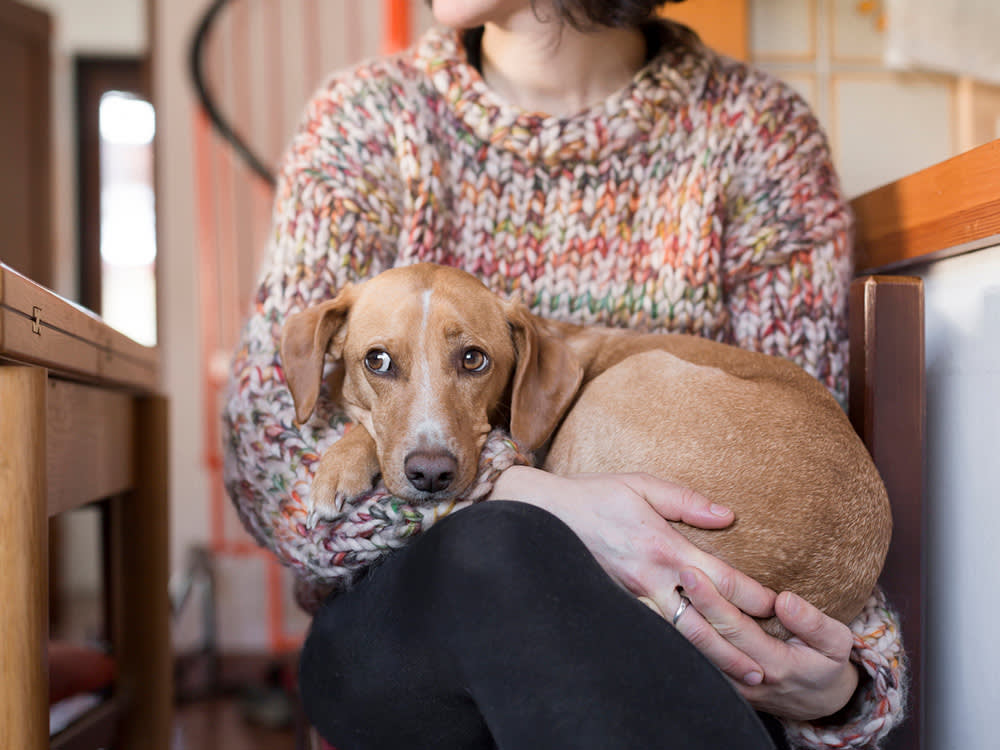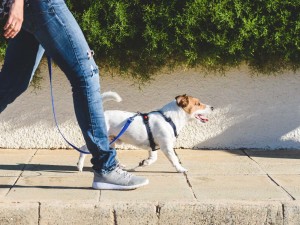Why Is My Dog Shaking? Causes and Treatment
A vet explains why the weather isn’t always to blame

Share Article
Dogs shake for a variety of reasons, both physical and emotional. If your dog is shaking, it’s important to try to determine the cause. If you can’t figure out why this is happening, or if your dog’s shaking is severe or persistent, you should take them to the veterinarian to rule out any medical problems. Here are the most common reasons for dog tremors, from seasonal stress to deadly diseases.
What characterises shaking in dogs?
Shaking in dogs can come in many forms, from little shivers to full-body convulsions. There’s a lot of overlap between some of the types of shaking.
Shivering usually consists of full-body, small contractions of muscles that can make it look like your dog is vibrating.
Tremors can look a lot like shivering but may be more localised and more consistent. In short-haired dogs, fine-muscle tremors can look like worms crawling beneath the skin as the muscles contract and relax uncontrollably.
Regional shaking (of the head or a limb) is a much broader, purposeful type of movement. This is generally intermittent and often indicates discomfort.
Myoclonus is an uncontrolled, sudden, brief jerking of a group of muscles. This is often rhythmic and repetitive.
Convulsions are characterised by generalised uncontrolled muscle activity, often violent in appearance.
Reasons your dog may be shaking
Shaking is a non-specific symptom in dogs, meaning many different situations and conditions can cause it. Because dogs can’t talk to their parents, it can be challenging to pinpoint the cause in some situations. Some common reasons why your dog may be shaking include:
Your dog is scared or stressed
Dogs get freaked out just like humans, and some tremble when they’re scared. Some causes of stress or fear are unsurprising, like fireworks or a leaf blower. Some dogs are also just scared of new things, people and places. A new rescue dog especially needs time to adjust to their new surroundings – a familiar thing to you, like an oscillating fan on a hot day, could be utterly terrifying for a dog who has never seen one. Be patient with them; understanding where they’re coming from can also make sense of their shaking.
Dogs with a true anxiety disorder may also shake often. Persistent signs indicate that there isn’t just a situational or environmental trigger causing your dog to tremble. They can include pacing, excessive panting, whining, and obsessively licking their lips or paws. Anxious dogs can also either shut down, freeze in fear or frantically try to escape. A certified behaviourist can coach you through training techniques to assuage your dog’s anxiety. You should always exhaust all training options first, but if your dog isn’t making progress after months of work, you can talk to your vet about anti-anxiety medication.
Your dog is excited
Shaking from excitement can appear deceptively similar but is less worrisome. Your dog may shake (and whine and pee) when you come home from work because they are just so happy to see you. Getting equally excited – as you obviously are – will only reinforce this behaviour, so if you feel like your dog is getting too worked up or needs to stay calm for medical reasons (they have heart problems, are recovering from surgery, or are a fragile little senior), try to make comings and goings chill affairs. As hard as this may be, don’t acknowledge your dog when they are in this frenzied state. Wait until they calm down before giving them the affection they seek.
Your dog has picked up a scent
Dogs can get very excited about a new smell they want to investigate. Intact male dogs especially can be anxious and excited if they can smell a female dog in heat and are unable to reach her. Be careful opening doors to the outside if your dog is excited, trembling and sniffing around exits – they may try to bolt as soon as the opportunity arises.
Your dog is seeking attention
Dogs aren’t great at reading clocks, but they certainly know when it’s time for a walk, a meal or some attention. If your dog feels like you are ignoring their very important needs, they may tremble or shake out of frustration. This trembling will usually stop as soon as you acknowledge them and show some interest in doing whatever they’re demanding.
Your dog is freezing
Some dogs like “Chihuahuas are known for shivering and shaking,” says Dr Sara Ochoa, a veterinarian at Whitehouse Veterinary Hospital. “They tend to always be cold and want a blanket to snuggle up with.” If you suspect your dog runs cooler than other breeds, feel free to use it as an excuse to kit them out in cosy jumpers.
Your dog has an ear infection
“If you notice your pet is suddenly shaking their head a lot, an ear infection could be to blame,” says Dr Ochoa. This behaviour could be joined by a funky smell emanating from their ears, yellow discharge, redness in the ear canal and swelling of the outer ear. Because the inner ear is what keeps you (and animals) balanced, your dog may also do an odd head tilt, back-and-forth eye movements and appear otherwise off balance and uncomfortable.
Dogs with floppy or hairy ears, such as Cocker Spaniels, Basset Hounds and Old English Sheepdogs, are more prone to ear infections. So are dogs with crudely cropped ears, as is sadly the case with some Pit Bulls and Dobermans. If your dog is doing any of the above, make a vet appointment because they will need topical antibiotics to clear up the infection.
Your dog ate something toxic (or feels sick for another reason)
If your pet is vaccinated and is shaking without rhyme or reason, they may have swallowed a toxic food, plant or home/lawn chemical – this could be anything from chocolate, mouldy food, and xylitol (a common sweetener in sugar-free gum and baked goods) to marijuana, antifreeze and fertiliser.
Nausea and motion sickness can also cause a dog to shake, as can pain. Animals often don’t show pain until it’s too much to bear (it’s a survival mechanism), so shaking can clue you into something else that could be going on with your dog’s health. Don’t just wait for the shaking to subside; book an appointment with your vet ASAP if your dog can’t settle.
Your dog has generalised tremor syndrome (GTS)
Breeds prone to generalised tremor syndrome (GTS) include Maltese, Poodles, West Highland White Terriers and other small dogs with white fur – it has even been dubbed the ‘little white shaker disease’ – but any dog can be affected. The conditionopens in new tab is caused by inflammation in the cerebellum, the part of the brain that controls coordination and regulates voluntary muscle movement. The cause of GTS is still unknown, but it’s thought to be an autoimmune disease because it responds to steroid treatment. Again, see your vet if there isn’t an obvious reason why your dog is shaking.
Your dog has low calcium levels or other metabolic issues
A number of different electrolyte problems can cause tremors in dogs. One of the most common is seen in mothers nursing their rapidly growing puppies. Making milk uses up a lot of calcium, and sometimes a nursing mother’s body just can’t keep up. She’ll use up her own calcium stores to feed her puppies and end up with hypocalcaemia (low blood calcium). This condition is called eclampsia (a different type of eclampsia is seen in pregnant humans) and results in facial itching, muscle tremors, then generalised shaking. This condition is treatable but requires emergency intervention by a veterinarian.
Your dog has distemper
The first sign of distemper – a deadly virus – is eye and nose discharge, so it’s not always easy to diagnose early. What follows is coughing, fever, diarrhoea and vomiting. Then come the shakes. When the disease progresses, it attacks the central nervous system and dogs begin showing neurological symptoms like uncontrollable muscle twitches, convulsions and seizures. Distemper is part of a puppy’s core set of vaccines, so it’s mostly seen in very young puppies that have not gotten all their shots yet.
“Distemper is so serious because there is nothing that can treat this disease. We can usually only provide supportive care,” says Dr Ochoa. “With these dogs being so young, their immune system cannot fully help them fight this disease and it is usually fatal. If not, it causes neurological issues, many of which are not reversible.” It’s also highly contagious so if you adopted a puppy from a shelter that doesn’t routinely vaccinate litters, get your pup checked out by your vet ASAP.
When should I be concerned about my dog’s shaking?
You should be concerned about your dog’s shaking if they are not responsive to you, shake uncontrollably, seem uncomfortable or painful, or have other ongoing symptoms. If your dog is shaking but still acting normally otherwise, try distracting them with a walk or a treat to see if they stop. Some dogs are prone to shaking due to anxiety and will shake as their response to any new or stressful situation.
When should I take my shaking dog to the vet?
If you feel your dog is shaking abnormally, it’s never wrong to get them checked out by a vet. While the cause may not be immediately evident at home, your vet may be able to isolate a source of pain or a metabolic issue that could be causing shaking. Definitely get shaking checked out if it is violent, if your dog doesn’t seem to be able to control their body, if your dog seems painful or if your dog is showing other symptoms like vomiting or diarrhoea.
Can medications or treatments help with my dog’s shaking?
The treatment for a dog’s shaking will vary depending on the underlying cause. Some treatments may be behavioural and aimed at reducing a dog’s anxiety. Medical causes for shaking may need anticonvulsant, pain control or other types of medications to help relieve symptoms. Sometimes, a warm blanket or cosy jumper may be all that is needed to control mild shaking, but it’s best to see a vet if your dog is shaking abnormally.
Frequently asked questions
Is there anything I can do at home to help my shaking dog?
If your dog has some mild shaking but is acting normally otherwise, you can try providing some extra attention, comfort with a cosy blanket or a treat to see if it helps. If the shaking is violent or concerning, contact your vet for guidance.
Is shaking always a sign of a serious health issue?
Shaking is not always a sign of a serious health issue in dogs. Some dogs will shake when they’re excited, in need of attention or nervous. While there are serious health issues and toxicities that can cause shaking, most mild trembling is benign.
References

Colleen Stinchcombe
Colleen Stinchcombe lives near Seattle, WA, where she works as a writer, editor, and content strategist. Her two rescue pups wish she were a professional ball-thrower.
Related articles
![woman with red hair holds senior Pomeranian dog]()
Senior Dog Care
Is your dog getting older? As dogs age, it’s important to recognise both physical and mental changes they may be experiencing and learn how to cater to those needs
Why Is My Dog Twitching In Their Sleep?
No need to panic, but keep that video you took in case a vet needs to see it
![Older dog playing with ball in a green field]()
Dog Arthritis Treatment: How to Relieve Arthritis Pain in Dogs
Tips for treating achy joints – from medications to massages
![Dog biting his tail on a summer Baltic seashore.]()
Understanding Limber Tail Syndrome: Causes, Symptoms and Treatment
Seeing your pup’s normally perky tail go limp can be unnerving, but it’s really nothing to panic about










